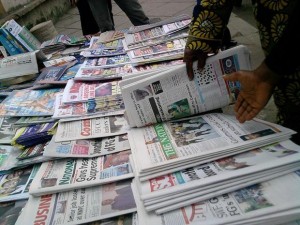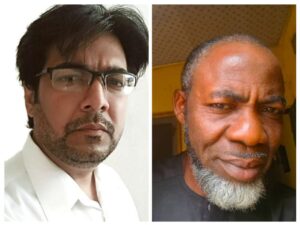Wale Fatade reviews media reporting in Nigeria and says “our journalism is bland and devoid of the humanity and empathy that can and might, galvanize citizens into action.”
Two recent happenings reminded me of my pet theory of “humanizing” journalism practice in Nigeria. Pardon me if humanizing journalism sounds oxymoronic, after all, what is journalism without humans? That’s why that phrase “human interest stories” sounds trite some times when we use it in classifying stories.
Every journalism student was taught the aphorism stories are about people, people and people. There can be no journalism without people.
But I think we need to emblazon that on newsrooms across the land because consciously, we have taken the people out of our brand of journalism. I agree, we could have done it unconsciously too, but the results remain the same; our journalism is bland and devoid of the humanity and empathy that can and might, galvanize citizens into action.
Last month, the Lagos East Baptist Conference, an association of Baptists in the Lagos East senatorial zone, organised a press conference to announce its annual kingdom life conference scheduled for the last week of the month. As the public relations officer, a volunteer post, it fell on me to coordinate and drive the process. Nothing, absolutely nothing, prepared me for some of what I encountered in the process.
Having spent some time out of newsroom working in development communications, there is no big deal in organizing press conferences, I presumed. Two television stations, however, asked us to pay to their accounts department before coming for the press conference and thereafter present the receipt to the editorial department. I was shocked and asked why the payment, the answer was that religious organisations reportage is classified as commercial and thereby advertorial.
Further discussions with some journalists in these organisations confirmed the practice and they spoke of the difficulties they faced in discharging their duties. Surprisingly, the radio arm of one of the stations did not classify the press conference as such and so covered it, but the television stations did not. Both stations asked for N150, 000 each for a press conference that might not be more than 60 or 90 seconds in reportage. Interestingly, two other television stations came and reported the conference very well.
While we should allow media scholars to find empirical reasons why some media organisations are more popular, one can safely assume that whenever we take people out of our stories and reports, we are alienating future readers and listeners. Our pages and airwaves are filled with governors, senators, legislators and president, leaving the hoi polloi out totally. Yes, the media is an elitist institution at certain levels, but we must change the narrative if we want to survive the apocalypse of our profession, which is already at our doorsteps.
The second instance was a link shared by a senior colleague of how Pennsylvania smallest newspaper is making a success publishing what we might think of as recondite stories. Read the story here https://www.inquirer.com/news/news-newspapers-media-pennsylvania-circulation-smalltown-journalism-20190829.html?utm_sq=g6i7gq0gg3&utm_source=Facebook&utm_medium=social&utm_campaign=SocietyofProfessionalJournalists&utm_content=Articles&fbclid=IwAR1dWCtg9YcN2x_HgwWiFFVJjttKlFxAmw7RCmPbuA87NBSEUGSi958c8mM The paper publishes stuff about cats and what have you. Unsurprisingly, most of the town’s residents identify with the newspaper and see it as theirs, something lacking in our part of the world.
Often I pillory the argument that citizens are not buying our newspapers because of the economic hardship in the land, a simple reason we often ignore is that we have taken the ordinary people out of our journalism. While some newspapers sell their front pages to corporate organisations for pictures others don’t, but the money still goes to the news editors or editors or in some instances publishers who ensure such pictures are used.
As an advocate of sustainable journalism and one who has suffered the indignity of unpaid salaries in a newsroom, I understand perfectly the need to make money and run a sustainable newsroom but we are doing so alienating a mass of citizens who we can rely on to sustain journalism. We don’t report our localities well if we report them at all and when citizens cannot see themselves in our stories, they vote with their feet and purses too. Most of the pictures we use are from PR agencies and not ordinary citizens, in fact, some newspapers don’t have official photojournalists any longer.
Have we ever wondered what will happen if we feature the local vulcanisers, tailors, private schools, community development associations, religious associations and others in that category? Those who do not blink twice before spending on airtime merely stand at newsstands and gawk at newspapers without purchasing any copy basically because they can’t see themselves or their types featured.
When last did you hear “our newspaper” mouthed by your citizen Joe? We must get the people back in our journalism and let’s see if things will change or not. Primary and secondary schools resumed on September 9 in Lagos State, test and see how many newspapers will feature pictures of students resuming in their schools during the week. In the past, such used to be a staple during resumption week.
Just imagine the thrill of seeing yourself on the pages of a newspaper as a boy or girl, that’s what happens too to adults when you feature them in your story.







Ahmad Gharzali
Exceptionally Excellent, I wonder if you’re a practicing Journalist in Nigeria!!
Just today, an online media outfit headlined : IMN “dared” Nigerian Police in Abuja. Forgetting the fact that the police made a public statement that all Muslims wishing to do the procession peacefully, and eventually it went well in Abuja. Why not simply head it “Shi’ite hold Peaceful Procession in Abuja”! without any bloodshed..